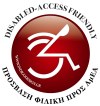Letter 1
Dear Hania
What do you think of the new assessment tool OUP are advertising at IATEFL? I would be interested to have your opinion. They have an example of it on their website .I find it amazingly simplistic and doubt its accuracy in placing students, especially younger students. There seems to be too few items used for assessment at each level. Have I missed something?
I think I'll continue to use my own placement test for younger children which deals with other aspects of learning as well as grammar.
Helen Howell
Letter 2
Dear colleague,
Raising social awareness about mobility disability in the ELT classroom may seem like quite a challenge, particularly at lower levels, or with young learners with little experience of the world.
At the IATEFL conference in Liverpool in April (which the Disabled Access Friendly campaign attended as winners of the Julia Tanner Memorial Scholarship co-awarded by TESOL Macedonia-Thrace, N. Greece and Burlington Books), Katie Quartano and Paul Shaw gave an interview outlining the goals of the Disabled Access Friendly campaign.
Their presentation shows you in detail how EFL teachers in Greece have used the campaign's free online EFL resources in the classroom with students at all levels to raise awareness about mobility disability. (Watch the presentation together with the slides and the handout, which you can open from the links given below the presentation screen).
By using these resources you join teachers from around the world who are making a difference!
With best wishes.
The Disabled Access Friendly campaign
Letter 3

I teach teenagers preparing for B2 level exams. How is the Disabled Access Friendly campaign useful to me?
There is tremendous pressure on both the teacher and the students in an exam class. The school’s reputation and your own ability as a teacher seemingly hang on your students ability to pass an exam. Under these conditions it may be that you feel your lessons are reduced to just making sure that your students have done the necessary groundwork and developed the required exam technique in order to reach this goal. This can be disheartening for everyone as this is not really what education is all about; you know that, and deep down, so do your students.
Education is not only about passing exams to prove you have acquired knowledge and skills, it embraces social improvement, respect for others, the promotion of well-being, truth, fairness and equality. When you became a teacher you may have had a vision that you would be contributing to equipping your students become adults who will take responsibility for the world they inhabit, and to think and question what they see and hear. Your efforts would help form character, increase strength of mind and sharpen the intellect. In this way you would play a role in improving other people’s lives and would leave your community and world better than you found it. And then somehow exams got in the way.
It can be difficult to find a reading text to use with your teenage exam class students that fulfils all of the following criteria:
- Is at B2 level
- Provides grammar and vocabulary relevant to an exam class
- Provides a topic appealing to teenagers
- Does something to open your students’ eyes to the world
This is where the Disabled Access Friendly campaign can help you.
This voluntary campaign focuses on issues of mobility disability and paves the way to changes being made both in attitude and infrastructure so that people with mobility disability are less isolated, have better access to the world, and are empowered to live more independent lives. The campaign’s EFL website, www.disabled-accessfriendly.com, provides teachers with free online lesson plans and reading texts. These can be used as additional material, for project work and examination practice. At the same time they provide students with the information necessary to allow them to put themselves in the shoes of someone with a mobility disability and stimulate them to understand others and to think how others feel.
Why not consider using some of the campaign’s graded reading texts in your exam class? It may be helpful at this stage to have a look at some of these texts in more detail, so you can see how you could use these with your students.
Friends are extremely important to teenagers, and they will be able to relate well to the ideas presented in a text entitled “What is it like for wheelchair users to make and keep friends”. The text uses vocabulary relevant to a social context and allows the reader to put themselves in the shoes of young people whose personal and social life changes when they become disabled.
“Why I’m glad my wheelchair says it all” practices modal verbs, “have to” and “be able to” and the use of “but” to show contrast. The text is based on an article written by a young wheelchair user and talks about treating people with dignity and kindness. The writer states that people should not need an obvious sign of disability like a wheelchair to think about other people’s feelings.
Teenagers interested in sports will enjoy a text entitled “Basketball”. The text practices past tenses and uses sports vocabulary. It is based on an article written by a member of Great Britain’s wheelchair basketball team, and talks about motivation.
The best teachers have always done more than just prepare students for tests. They raise awareness of the world in which we live and try to make it a better place. We invite you to visit our site www.disabled-accessfriendly.com. for material to help you be one of those teachers.
Katie Quartano



|